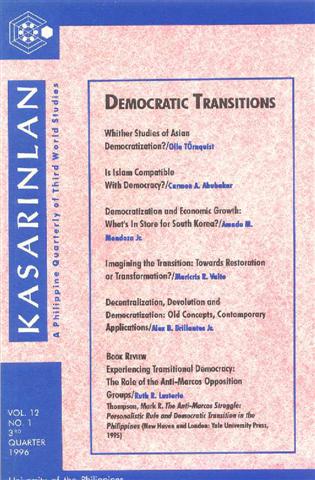Imagining the Transition: Towards Restoration of Transformation
Abstract
The era of post authoritarian transition in the Philippines marks a period of searching as the end of the Cold Was and the apparent demise of state socialism necessitate a paradigm shift and an alternative social order. An assessment of the new roles of various actors in the broad mass movement play in the democratization process, is therefore, in order, as these, so-called change-agents continue to shape the kind of democratic transition taking place in the midst of a de-ideologizing political arena. In recognition of the need to redefine the roles and redirect progressive efforts, the grassroots movements need to attend to queries of paramount importance: (1) the role of class politics in the context of current realities (2) the extent to which the democratic space may be utilized without having to compromise the popular movements’ commitment to popular struggle; and (3) the current notions regarding the state, that is, whether or not state power should be seized. To reflect on these issues is to shed light on two fundamental issues confronting popular movements in the changed political condition: whether to join the mainstream for the eventual creation of a new political and economic order, or to formulate a new framework for carrying out radical structural change.
How to Cite
VALTE, Maricris R..
Imagining the Transition: Towards Restoration of Transformation.
Kasarinlan: Philippine Journal of Third World Studies, [S.l.], v. 12, n. 1, july 2007.
ISSN 2012-080X.
Available at: <https://journals.upd.edu.ph/index.php/kasarinlan/article/view/852>. Date accessed: 23 sep. 2025.
Section
Features
By submitting a manuscript, the authors agree that the exclusive rights to reproduce and distribute the article have been given to the Third World Studies Center.



